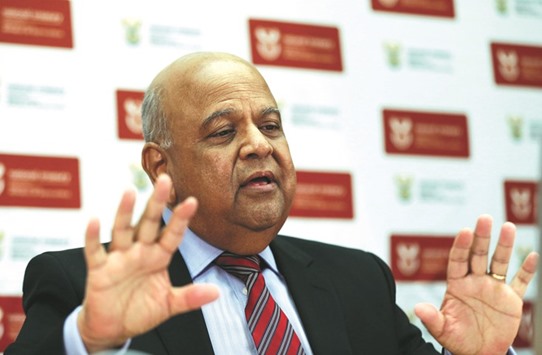On Friday, Fitch kept the credit score of Africa’s most industrialised economy one notch above junk status but changed its outlook to negative from stable, warning that political risks could hurt growth.
The agency said that ANC in-fighting was likely to continue at least until the party’s electoral conference in December next year and this would distract policymakers and undermine the investment climate.
“This will distract policymakers and lead to mixed messages that will continue to undermine the investment climate, thereby constraining GDP growth,” Fitch said.
The ANC, which in August suffered its heaviest electoral losses since coming to power in 1994, said rating agencies’ concerns about political uncertainty were curious given that political disagreements were a regular feature of democracy.
“The conference’s impact on governance and macroeconomic performance is an untested and unscientific observation,” ANC spokesman Zizi Kodwa said in a statement.
Moody’s kept its Baa2 rating for South African debt unchanged on Friday but said political uncertainty was hurting business confidence and without fundamental structural reforms to support higher medium-term growth a downgrade was likely.
The threat of downgrades has focused the spotlight on President Jacob Zuma and his administration.
This month an anti-graft watchdog alleged influence-peddling in Zuma’s government.
Also worrying investors was the decision by state prosecutors last month to charge Finance Minister Pravin Gordhan with fraud, a move seen by many as a ploy by people linked to the president to seize control of the Treasury.
Zuma has denied any wrongdoing.
Analysts said the ongoing political skirmishes combined with weak economic growth had raised the chance of downgrades in 2017.
“Zuma has focused on removing Gordhan and maintaining his grip on power, while Gordhan (has) been working very hard to avert a ratings downgrade,” Fitch said.
“The risk of a downgrade has clearly risen,” Stanlib chief analyst Kevin Lings said. “Without structural reforms to lift growth and ensure more political stability, Moody’s will be forced to downgrade South Africa.”
Old Mutual economist Rian le Roux said Standard & Poor’s, which ranks South Africa one notch above junk with a negative outlook, and is due to publish a review next Friday, said that the agency’s institutional strength rating could trigger a downgrade.
“If they change this to negative on account of the political tensions concerning the finance minister and concerns over the broad direction of economic policy, then they could downgrade us,” le Roux said.
S&P’s cut state-owned power utility Eskom’s credit rating a further notch into subinvestment on Friday, raising fears this was a precursor to a sovereign rating downgrade.
Gordhan had been due to appear in court earlier this month on graft charges that many analysts saw as an attempt by Zuma associates to oust him.
The charges were dropped at the last minute, exposing tensions in the ANC as several ministers came out in his support.
Gordhan was appointed only last year to calm panicked investors when Zuma sacked two finance ministers within four days.
Gordhan and deputy president Cyril Ramaphosa have been pushing for reform of loss-making state companies, including power company Eskom and national airline South African Airways.
A recent watchdog report included allegations that Zuma ensured one business family won huge preferential contracts to supply Eskom with coal.
Zuma said on Friday he would launch a court challenge to the report and its order to set up a judicial inquiry.
The ANC is due to elect a new leader at the end of next year, ahead of the 2019 general election when Zuma must stand down after serving two terms.
Gordhan

